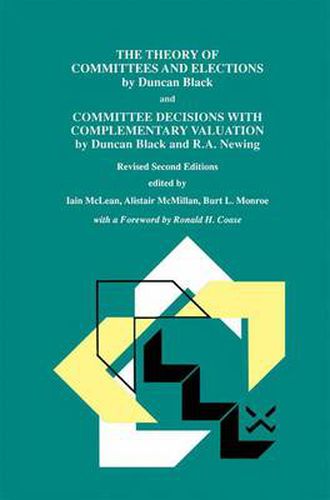Readings Newsletter
Become a Readings Member to make your shopping experience even easier.
Sign in or sign up for free!
You’re not far away from qualifying for FREE standard shipping within Australia
You’ve qualified for FREE standard shipping within Australia
The cart is loading…






This title is printed to order. This book may have been self-published. If so, we cannot guarantee the quality of the content. In the main most books will have gone through the editing process however some may not. We therefore suggest that you be aware of this before ordering this book. If in doubt check either the author or publisher’s details as we are unable to accept any returns unless they are faulty. Please contact us if you have any questions.
R. H. Coase Duncan Black was a close and dear friend. A man of great simplicity, un worldly, modest, diffident, with no pretensions, he was devoted to scholarship. In his single-minded search for the truth, he is an example to us all. Black’s first degree at the University of Glasgow was in mathematics and physics. Mathematics as taught at Glasgow seems to have been designed for engineers and did not excite him and he switched to economics, which he found more congenial. But it was not in a lecture in economics but in one on politics that he found his star. One lecturer, A. K. White, discussed the possibility of constructing a pure science of politics. This question caught his imagination, perhaps because of his earlier training in physics, and it came to absorb his thoughts for the rest of his life. But almost certainly nothing would have come of it were it not for his appointment to the newly formed Dundee School of Economics where the rest of the. teaching staff came from the London School of Economics. At Glasgow, economics, as in the time of Adam Smith, was linked with moral philosophy. At Dundee, Black was introduced to the analytical x The Theory o/Committees and Elections approach dominant at the London School of Economics. This gave him the approach he used in his attempt to construct a pure science of politics.
$9.00 standard shipping within Australia
FREE standard shipping within Australia for orders over $100.00
Express & International shipping calculated at checkout
Stock availability can be subject to change without notice. We recommend calling the shop or contacting our online team to check availability of low stock items. Please see our Shopping Online page for more details.
This title is printed to order. This book may have been self-published. If so, we cannot guarantee the quality of the content. In the main most books will have gone through the editing process however some may not. We therefore suggest that you be aware of this before ordering this book. If in doubt check either the author or publisher’s details as we are unable to accept any returns unless they are faulty. Please contact us if you have any questions.
R. H. Coase Duncan Black was a close and dear friend. A man of great simplicity, un worldly, modest, diffident, with no pretensions, he was devoted to scholarship. In his single-minded search for the truth, he is an example to us all. Black’s first degree at the University of Glasgow was in mathematics and physics. Mathematics as taught at Glasgow seems to have been designed for engineers and did not excite him and he switched to economics, which he found more congenial. But it was not in a lecture in economics but in one on politics that he found his star. One lecturer, A. K. White, discussed the possibility of constructing a pure science of politics. This question caught his imagination, perhaps because of his earlier training in physics, and it came to absorb his thoughts for the rest of his life. But almost certainly nothing would have come of it were it not for his appointment to the newly formed Dundee School of Economics where the rest of the. teaching staff came from the London School of Economics. At Glasgow, economics, as in the time of Adam Smith, was linked with moral philosophy. At Dundee, Black was introduced to the analytical x The Theory o/Committees and Elections approach dominant at the London School of Economics. This gave him the approach he used in his attempt to construct a pure science of politics.